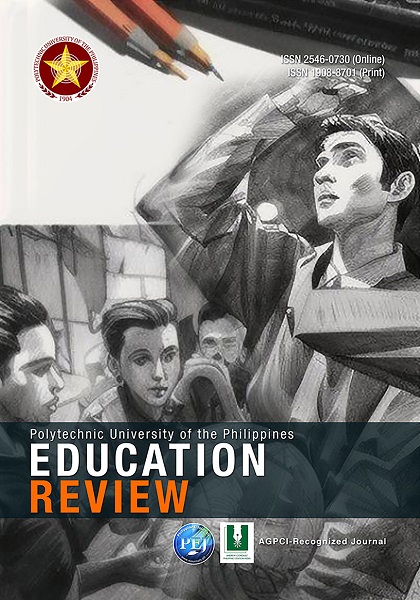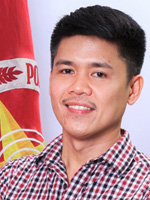- Description
The Education Review (EdRev) is published once a year in the month of June. It presents articles and researches on education which is aligned with the research thrusts of the Polytechnic University of the Philippines as stated in the University Research Agenda (URA). In the URA, the following topics of interest are the focus of this publication, namely:
- Education technology/innovation and change;
- Communication technology; student support services;
- Professional development and faculty support; quality assurance;
- Curricular benchmarking;
- Institutional development;
- Policy studies;
- Outcomes-based education;
- Inquiry-based education;
- Promoting full, decent and productive employment;
- Transformative education;
- Home-school-community service, employment impact;
- Graduate tracer studies;
- Culture and values; and
- Teacher and student achievements
The contents of EdRev include analyses of theories, studies on topics of interest, application of methods and theories, research reports, materials development, policy descriptions and implementations, qualitative and quantitative studies, and reviews.
Editor and Administration Address: Education Review, Polytechnic University of the Philippines, Research Publications Office, S425, Anonas St., Sta. Mesa, Manila
Education Review invites writers to publish their articles that have not been published elsewhere. Writers who intend to publish their articles may refer to the Guidelines for Article Submission.
Education Review is published by the Office of the Vice President for Research, Planning, Extension and Development in coordination with the Research Publications Office of the Polytechnic University of the Philippines.
- Print ISSN
- 1908-8701
- Online ISSN
- 2546-0730
- Email Address
- edrev@pup.edu.ph

Editorial Team
Editor-in-Chief
- Dr. Marion A. Cresencio
Managing Editor
- Prof. Mary Joy Sawa-an
Associate Editors
- Dr. Annabelle A. Gordonas
Associate Editor/Language Editor
- Dr. Emeteria Leonila A. Perez
External Associate Editor
- Dr. Alvin Barcelona
- Prof. Jhon Philip D. Cainoy
Principal Contact Person
- Name
- Dr. Marion A. Cresencio
- Email Address
- macresencio@pup.edu.ph
- Contact Number
- 5335-1707 Local 372
- Address
- PUP Graduate School, M.H. Del Pilar Campus

Criteria for Authorship
Authorship of the Paper
Authorship should be limited only to those who have made a significant intellectual contribution to the conception, planning, design, execution, or interpretation of the study.
In multiple co-authorship, the corresponding author should ensure the editorial board that all co-authors are listed and that no other uninvolved persons are included in the list. The corresponding author, likewise, should also assure the board that the final draft/version of the paper was agreed upon by all co-authors.
Disclosure and Conflicts of Interest
All authors should disclose any possible conflict of interests that may be construed to influence the results or interpretation of the manuscript.
Originality, Plagiarism and Acknowledgment of Sources
The author must submit only original works and must appropriately cite or quote the work or words of others. He/she assures that the paper does not infringe laws on plagiarism and copyright.
Redundant or Concurrent Publication
Manuscript that have been copyrighted and/or published in other journals/books cannot be submitted. Also, manuscripts which are undergoing review elsewhere must not be submitted.
Errors in the Published Works
The author, upon discovery of any significant error in his/her own published work, must notify the editor or publisher and must cooperate with the editorial team to rectify the error in form of an erratum.
Guidelines for Article Submission
1. Identifying information of author/s.
1.1 Name
1.2 Organization/Institutional Affiliation
1.3 Email address
2. The research project should be related to the focus or topics of interest of the Education Review.
3. The research topic should be relevant to a variety of context across education disciplines, properly documented and supported – not parochial.
4. Abstract of the paper must be limited to 250 words. It must reflect the article’s main focus and summarizes the essential points; objective and theoretical framework, method, relevant findings, conclusions, and recommendations, where relevant. Key words must be provided.
5. The title should embody the contents of the article.
6. Main body of the article must contain the introduction, objectives, theoretical framework, literature review, method, findings and discussion, conclusions, and recommendations.
7. APA citation style, 7th edition, is the preferred documentations style. This must be applied in in-text and terminal citations, punctuations, abbreviations, tables, headings and presentations of statistics.
8. Figures provided should be clear and in JPEG format.
9. Manuscript style of the paper:
a) Should be in MS Word 93-2007 document format
b) Should be typed using Bookman Old Style, size 11
c) Should have justified margins, one-inch size on all sides
d) Should be double spaced except for the abstract, long quotations, tables, and references
e) Should have pages consecutively numbered at the bottom right of the paper
f) Should have 5,000-6,000 words only including references
10. To be considered for publication in the Education Review, it must be an original work; is not published elsewhere, is not submitted to another publication, nor is currently being reviewed.
11. Articles written in Filipino are accepted. The abstract however must be written in English.
12. All article submission will undergo double-blind review.
13. The article should be submitted to edrev@pup.edu.ph. A notice of receipt will be sent to the authors.
Peer Review Process and Policies
• Initial screening process of the Editorial Board. Prior to the review process, initial screening is done by the members of the editorial board in order to guarantee the appropriateness of the manuscript for publication. The editorial board checks the following elements of the manuscripts: referencing standards, grammar, plagiarism, and other technical standards. Also, the editorial board reserves the right to filter manuscripts that are irrelevant to the Journal’s theme.
• Blind peer-review process. The Journal observes double-blind peer review system where both the identities of the reviewer and the contributor are kept confidential from each other. Since the review process could be tedious, we ask for the patience of the author.
• Notice of acceptance or rejection. Based on the feedback from the referees or reviewers, the author will be informed whether the Editorial Board has decided to accept or reject the submission for publication. In many cases, the author is tasked to revise one’s submission based on the recommendations of the referees and the Editorial Board. Both the reviewers and the Editorial Board have the final say whether to include the manuscript or not in the Journal.
• Notice to publish. A notice to publish will be sent to the author once the recommended revisions are addressed. In this stage, we require full cooperation from the author as this stage involves editing the style, format, grammar, and layout of the accepted submission.
COPYEDITING
All accepted manuscripts for publication are copyedited, proofread, and sent back to the contributor for approval of significant/substantial editorial changes. However, the editor reserves the right to make minor changes for clarity and accuracy without seeking the author’s permission.